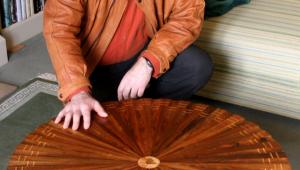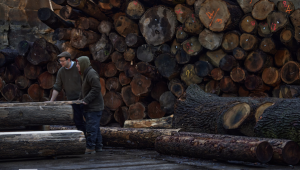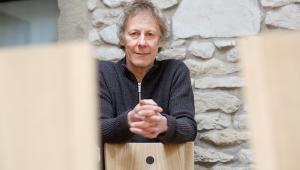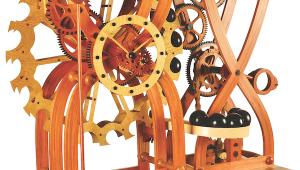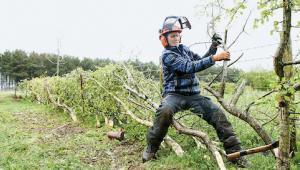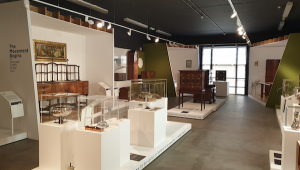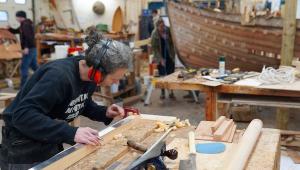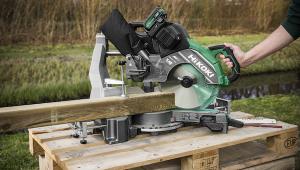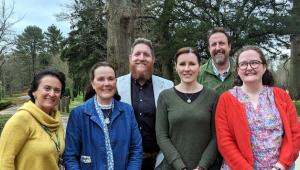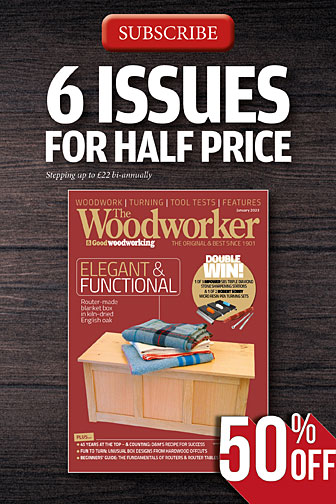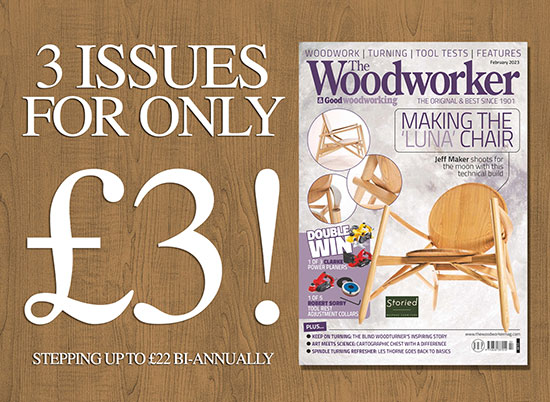The Bristol Five
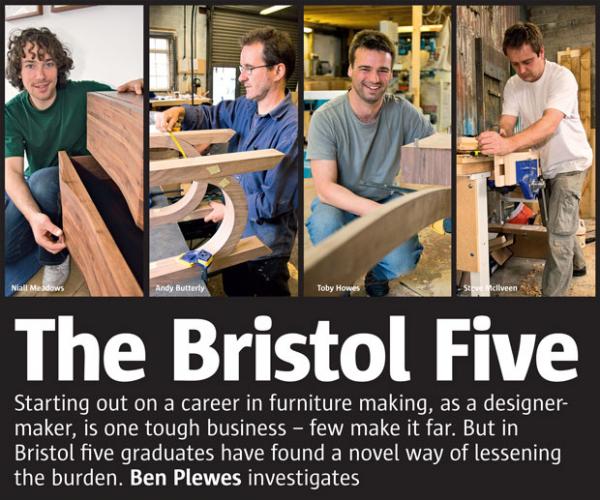

As the car’s sat-nav homes in on my destination it takes me left off Gloucester Road and down a small alleyway towards what looks like an automotive complex. I’m confused: every building I see contains cars – being fi xed, recycled, re-sprayed, cleaned, you name it… But there are no furniture makers.
I call a number on my mobile phone. “Just knock on number 14’s roller door – it’s next to the big blue doors, the guys are in,” instructs Niall Meadows through the speaker.
He isn’t there himself; he’s manning an exhibition of his furniture with his twin sister, Kilda, who has a range of ceramics on display. The exhibition is at Room 212 on Gloucester Road, which is about half a mile from where I am now.
I give the door a loud knock and enter the workshop where I’m greeted by three friendly faces, all brandishing hand tools of one sort or another. The workshop has a buzz of creativity about it and feels completely alien to the automotive yard just a few metres away. I have a quick look around while getting directions to Room 212, and after a few minutes I set off, camera in hand, to meet Niall Meadows.
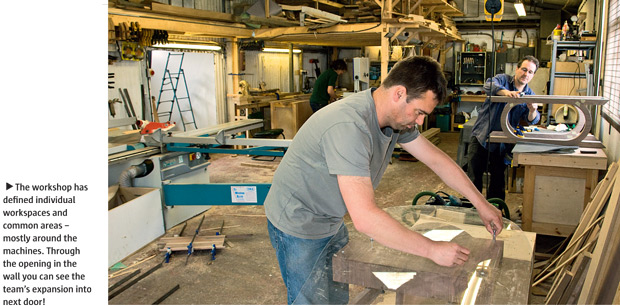
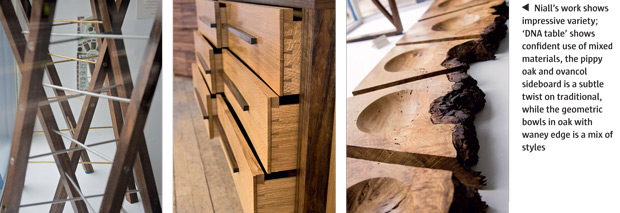
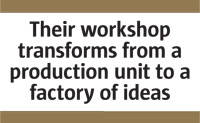
I ask Niall what drives his passion for furniture design. He tells me it’s about finding unique solutions to problems in a way that has been thought through from the ground up. Niall prefers to draw inspiration from furniture makers that he’s met personally as opposed to established names in the industry. It’s a refreshing approach – like others with a passion for wood, Niall has found a grounding force in furniture making that goes beyond the thin veneer of modern life.
Back at the workshop Niall gives me a run down on the premises and a guided tour of its facilities. The space is ideal, the rent is cheap and the bill includes power, water and business rates. Split that five ways and you can see good reason to form a cooperative. “It was certainly worth waiting for,” says Niall who proudly points to a large electricity transformer in the far corner of the workshop and explains that the big grey lever on the side controls the power for the entire industrial estate – perhaps that’s why the landlord is keen to remain in their good books!
A walk around the workshop reveals some great kit. The centrepiece is an Italian Griggio panel saw with sliding bed, which is easily big enough to handle 8x4ft boards. Toby bought it for £800 from a local kitchen manufacturing company who were upgrading their equipment after ten years of use. I can easily see how a machine like this becomes a focal point in a workshop of this size.
The financial advantages of forming a cooperative don’t end with rent and electricity bills then. Everyone clubs together to make sure the workshop has a full complement of tools. Toby bought the panel saw. Niall recently bought a Festool Domino jointer, which paid for itself within a couple of jobs. Andy supplied the bandsaw and planer thicknesser. Caroline (ah, yes Caroline – our illusive fifth element, we’ll come to her in a moment) bought the pillar drill, disk sander and mitre trimmer, while Steve has just purchased a new three-phase Sedgewick planer thicknesser which will really add some grunt to the workshop’s machining capabilities.
There is other kit too of course, but the point is that everyone clubs together to feed the workshop. If at any point one of the group should decide to go their separate way, they take their kit with them – the idea being that every member of the cooperative has a physical stake in the business that remains their own.
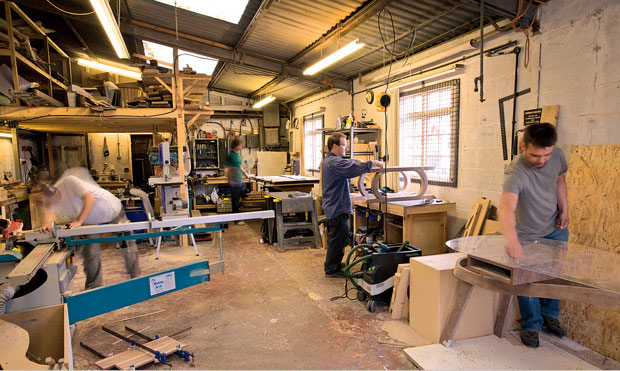
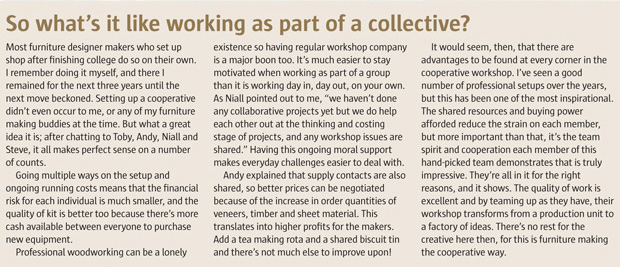
During their final year everyone had worked hard for their end-of-year exhibition, which is customary for an advanced course in furniture making. Unfortunately the exhibition was cancelled – a potential disaster for final-year students who rely on this kind of exposure to get their names into circulation. Exhibitions are the best form of advertising when you’re fresh out of college, an opportunity for the lucky ones to line up commissions, while for everyone else it’s a chance to make valuable contacts for the future. So the exhibition being cancelled was bad news for this group of dedicated furniture makers. Were they deterred? Not a chance! They got on with the job of building things well and created their own display stand at the New Designers exhibition at the Business Design Centre in Islington, London.
Next on the agenda was the Celebration of Craftsmanship & Design exhibition in Cheltenham. Toby and Niall exhibited pieces at the prestigious annual event run by Betty Norbury. “It was a great experience,” says Toby. “I came away with enough work to keep me going for the best part of the next year.” That kind of incentive is hard to ignore, so with the exhibition requiring that no piece is submitted for entry twice Niall, Toby and Steve are busy designing and making new pieces for inclusion in the 2008 ‘Betty Norbury’.


When I met Toby, he was busy finishing off a custom-designed desk in American black walnut. Its sweeping laminated curves are both beautiful and structural. A 12mm toughened glass top with stainless steel fittings ensures its structural elements are visible from all angles. With only two weeks to go before completion, most of the desk was there to see.
Toby’s work has a contemporary feel to it – he seems to have mastered that fi ne balance of traditional technique and modern design.
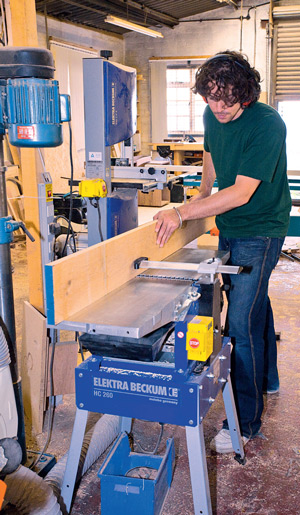
…Life is better now, though. Andy has an impressive waiting list and a good number of valued customers. Next on the agenda is a freestanding kitchen for a client in Oxford, a sideboard, a pair of matching desks… and did I mention a little show called the Celebration of Craftsmanship & Design? Well, that’s on the ‘to do’ list, too.
Now we come to Caroline. That’s Caroline Williams. Caroline was heavily involved at the outset. At the beginning she had a part-time job and would devote the rest of her time to setting up the workshop. She now works full-time as a doctor and describes herself as a silent partner, coming in to work on the odd piece from time to time, with a foot still very much in the door.
Similarly Steve is currently part time at the workshop but conversely aims to ramp that up soon. He’s working his way through a telecoms contract at the moment and wants to be full-time by the end of the year. Steve’s bench occupies an old spray shop adjacent to the main workshop. In fact the workshop is going through a bit of an expansion and there’s talk of integrating a spray booth next to Steve’s work area too.
In addition to studying furniture making at Bristol College, Steve spent two years working for SF Furniture in Gloucestershire, making bespoke furniture. He says, “the time I spent working in a full-time professional environment gave me valuable experience,” which has led to his decision to join the workshop full-time later in the year.
- Log in or register to post comments
